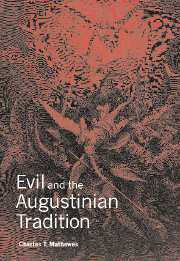Book contents
- Frontmatter
- Contents
- Acknowledgments
- List of abbreviations
- Introduction: reaching disagreement
- I PRELIMINARIES: EVIL AND THE AUGUSTINIAN TRADITION
- II GENEALOGY: REMEMBERING THE AUGUSTINIAN TRADITION
- III THE CHALLENGE OF THE AUGUSTINIAN TRADITION TO EVIL
- Conclusion: realizing incomprehension, discerning mystery
- Works cited
- Index
Conclusion: realizing incomprehension, discerning mystery
Published online by Cambridge University Press: 22 September 2009
- Frontmatter
- Contents
- Acknowledgments
- List of abbreviations
- Introduction: reaching disagreement
- I PRELIMINARIES: EVIL AND THE AUGUSTINIAN TRADITION
- II GENEALOGY: REMEMBERING THE AUGUSTINIAN TRADITION
- III THE CHALLENGE OF THE AUGUSTINIAN TRADITION TO EVIL
- Conclusion: realizing incomprehension, discerning mystery
- Works cited
- Index
Summary
The theology of evil can therefore be derived much more readily from the fall of Satan … than from the warnings in which ecclesiastical doctrine tends to represent the snarer of souls. The absolute spirituality, which is what Satan means, destroys itself in its emancipation from what is sacred.
Walter Benjamin 1977, 230This book has argued for the plausibility of original sin theologically and ethically. But it has also been an attempt to work out the implications of original sin on a methodological level. Indeed I understand an acceptance of original sin to be entailed by the meaning of tradition. In this conclusion I want to say something about what this means; for, typically, appeals to tradition are made to help us see better. In this book, however, our appropriation of tradition has not improved our vision, but clouded it; “tradition” has helped us see that we do not understand; it has helped us realize our incomprehension of evil's roots. And this I take to be a necessary prolegomenon to our discernment of the mystery of our response to evil – a response which, this book has argued, is irremediably theological.
This work has argued that the Augustinian tradition of moral and religious inquiry offers us considerable resources for understanding and responding to the challenges that evil puts before us. This argument is actually a series of arguments, one nested inside another.
- Type
- Chapter
- Information
- Evil and the Augustinian Tradition , pp. 239 - 246Publisher: Cambridge University PressPrint publication year: 2001



